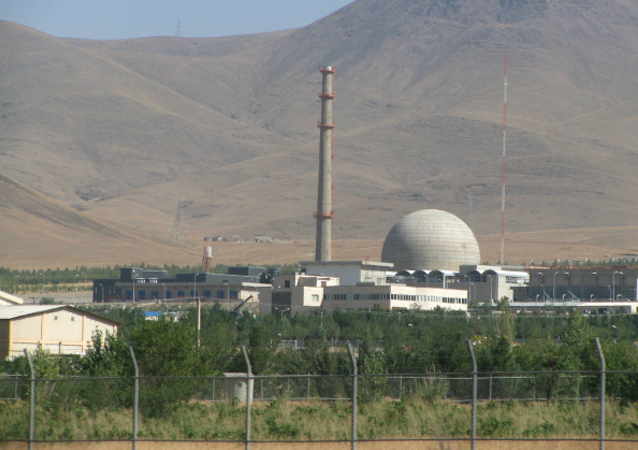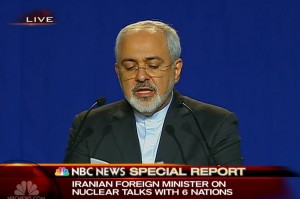Congress Must Say “No” to Funding Iran’s Nuclear Ambitions
Double Reward for Iran – nuclear infrastructure plus big payoff to fund regional hegemony.

Last week President Obama finally stated openly what everyone, including the Iranians, has known all along – that he is simply not willing to use military force to stop Iran from attaining a nuclear weapon.
Those of us with common sense and reason also know that his negotiations with Iran might delay, but will not stop, that country from attaining a nuclear weapon. We know this both because Obama himself told us so in an interview with NPR, and because once a military option is clearly off the table, Iran has no incentive to make concessions in a negotiation and no reason to comply with a negotiated agreement.
With no US-sponsored military solution, at least for the remainder of Obama’s term, and no diplomatic solution, there are still two things left that the US can do.
First, we can refrain from criminalizing the actions of other states for whom military action against Iran would be considered both reasonable and necessary. Second, we can, at the very, very, least, refrain from funding Iran’s pursuit of a nuclear bomb ourselves.
For the US and the European nations involved in the current negotiations, it’s not unreasonable to take the position that, while a nuclear strike is technically possible, the casualties that we would suffer if we attacked Iranian nuclear facilities are too high a price for us to pay. Of course, it is contrary to the President’s promise, repeated twenty-eight times, over a period of years. It’s not, however, unreasonable.
As Lee Smith argued persuasively in the Weekly Standard in March, however, the assertion that there is no viable military option with Iran is not necessarily correct. It’s not certain, he argued, that they would be able to rebuilt quickly, or even at all, after a military strike.
As recently as April 2, Israel’s Minister of Strategic Affairs Yuval Steinitz asserted that for Israel, at least, the military option is still available. A recent poll shows that Americans favor an Israeli strike on Iran’s nuclear facilities by two to one.
For the P5+1 to reach a nuclear agreement with Iran will, however, put an international stamp of approval on the facilities that Iran can then use to build its nuclear weapon. By implication, therefore, it also criminalizes actions of any other state that may feel that the benefits of a military strike on Iranian facilities, for them, outweigh the costs.
Not only Israel, but US ally Saudi Arabia may feel that it is necessary to take the risk involved in striking Iran militarily. We must not tie their hands with a deal that legitimizes Iranian nukes.
Even if it were true, however, that no military strike by any nation could stop Iran from its pursuit of nuclear weapons, the United States still has, at a bare minimum, an obligation not to fund Iran’s nuclear program ourselves.
Writing in Foreign Policy, David Rothkopf estimates that Iran currently has over $120 billion in frozen assets, and that ending sanctions would provide Iran with another $20 billion a year in oil sales. A 15-year deal, he estimates, would result in a relative gain of $420 billion for Iran.
It’s not clear what share of those frozen assets are being held in the US, or what percentage of potential future oil sales would me made to us. It’s a fair guess, though, that it would be a material amount. (For a frame of reference, in 2014 alone, we purchased approximately $40 billion of oil from Saudi Arabia.)
Presumably, Iran must pay for its nuclear program somehow. Lee Smith wrote of David Samuels’s assertion that Iran does not have the capacity to produce its nuclear infrastructure on its own, but must purchase it. It also must pay its scientists and staff, and purchase raw materials.
The release of any frozen assets held in the US, and future oil sales from Iran to the US, would undoubtedly at least partially pay for Iran’s nuclear program.
Even if you suppose that assets currently frozen in the US, or US oil purchases, will not fund Iran’s nuclear program directly, it hardly matters. Money is fungible, and US funds would certainly fund Iran’s nuclear program at least indirectly.
The very, very, least that the US can do is to keep any Iranian assets in the US frozen, and to continue to refuse to do business with Iran. This means rejecting the proposed deal, even if that means that the international sanctions regime falls apart. It also means extending the Iran Sanctions Act of 1996, which targets Iran’s support for terrorism and ballistic missile program, but not its nuclear program.
If we are not willing to do the dirty work to stop Iran from building nuclear weapons, let’s not hamstring those that would. And if it’s really true that there is no military option at all, and no diplomatic option — that is, if we really must face the grim reality that we either can’t or won’t stop Iran from building a nuclear bomb — let’s at least make sure they don’t do it with our money or money that we at one time had control over.
Featured Image: Arak nuclear facility, Source: Wikipedia
———————
Mirabelle is a non-practicing lawyer, skier, chef and blogger. She mainly writes about Israel, the US-Israel relationship, and media bias at Israellycool.com. On twitter: @MiraWard375
 DONATE
DONATE
Donations tax deductible
to the full extent allowed by law.










Comments
Your report coupled with this below….OY VEY!!!
Obama secretly backing Muslim Brotherhood
By Bill Gertz – – Wednesday, June 3, 2015
President Obama and his administration continue to support the global Islamist militant group known the Muslim Brotherhood. A White House strategy document regards the group as a moderate alternative to more violent Islamist groups like al Qaeda and the Islamic State….
http://webcache.googleusercontent.com/search?q=cache:3wSUCZifiAwJ:www.washingtontimes.com/news/2015/jun/3/inside-the-ring-muslim-brotherhood-has-obamas-secr/%3Fpage%3Dall&client=firefox-a&hl=en&gl=us&strip=1
The policy of backing the Muslim Brotherhood is outlined in a secret directive called Presidential Study Directive-11, or PSD-11. The directive was produced in 2011 and outlines administration support for political reform in the Middle East and North Africa, according to officials familiar with the classified study.
Efforts to force the administration to release the directive or portions of it under the Freedom of Information Act have been unsuccessful.
I believe this idea of Obama intentionally, or preferentially, backing the Muslim Brotherhood (as opposed to wanting to uphold it as the legitimate government in Egypt) is disinformation from Putin.
And he’s doing a lot of disinformation.
http://www.npr.org/2015/06/04/412046928/russian-trolls-spread-false-information-on-the-internet
http://www.nytimes.com/2015/06/07/magazine/the-agency.html
This even went so far as to fake a terrorist attack on the United states by ISIS. You probably never heard of it because news did not spread far – but it probably was not intended to. This was probably intended to help someone penetrate ISIS and it only had to fool someone in ISIS.
Now about the supposed U.S. Moslem Brotehrhood link:
Here is a link telling about the claims (it doesn’t say by Russia, but this idea of Russian airplanes saving Egypt from U.S. military intervention has to come from Russia)
http://egyptianchronicles.blogspot.com/2014/08/it-all-started-with-egyptian-facebook.html
In a coming day, the body-count from the Obama-Clinton-Kerry foreign debaclessssss will be totaled up.
So far, just in Libya alone, the death toll is staggering. Millions of people have been made miserable, and their lives still hang in the balance.
Hellary Clinton is the singular actor in that tragedy, which was wholly avoidable.
By keeping Qaddafi in power?
If that’s the goal, maybe non-intervention wouldn’t be enough and he should have been sold weapons, too, and torture equipment.
There wouldn’t be any casualties, except on the Iranian side. And it probably would start with an all out assault on Iranian air defenses and missiles and take days or weeks.
The worry is that Iran would respond with an attack, or attacks, either standard military or terrorist, somewhere else in the world.
I didn’t read it that way. He didn’t say what he would not do.
He said a military solution would not fix it, just delay it.
There are two problems with this statement.
1) Who says a military solution has to be a one-time fix? It wasn’t with Iraq.
Those who opposed the 2003 war said the status quo was good enough. And what was the status quo? A. Patrolling Iraqi airspace and bombing any time Saddam seemed to be building something he wasn’t supposed to. Not the sanctions alone, which he tolerated, while accusing the sanctions of killing hundreds of thousands of Iraqis.
2) Obama’s proposed deal with Iran, even if it worked the way he said it would, also would be a temporary fix, as he admits that after about a dozen years, Iran would be very close to a nuclear bomb.
But Obama has never said he would never use the military option. He has just said what, in his thinking, could come next if the deal fails, and that is more sanctions.
Now it may actually require the threat of military action to get Iran to agree to dismantle it’s nuclear program and prove beyond a doubt that it is o threat to anyone.
The “good faith” expectation by Obama that the IRG will simply allow the Iranian “government” or even that the “government” itself, if had the power, would simply plow all these unfrozen assets and anticipated oil profits into righting the Iranian economy has got to be the some of the most narcissistic garbage I’ve ever seen.